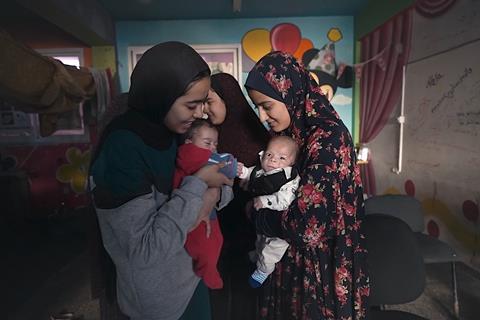Mohammed Sawwaf’s emotional second feature premieres at IDFA

Dir: Mohammed Sawwaf. Palestine/Qatar/Netherlands. 2025. 96mins
Mohammad Sawwaf’s stirring documentary tells an emotional story about a mother who, in the chaos of wartime Gaza, is separated from her newborn twins. And it also effectively uses this narrative to illuminate a subject that has been largely invisible through two years of bleak TV news bulletins: what is it actually like to live in Gaza, day after day?
Does not pull any punches
Originally commissioned as a 25-minute short for Al Jazeera’s flagship TV documentary series ’Witness’, Gaza’s Twins, Come Back To Me has now been extended to feature length (a 52-minute edit will be made available for TV sales in early 2026). Sawwaf’s sensitive handling of this subject should appeal to wider audiences following its premiere in IDFA’s Frontlight section.
Opening with footage of an aerial bombardment that literally shakes the camera out of the operator’s hand, Gaza’s Twins does not pull any punches when it comes to charting the devastation, the suffering and the sheer weight of ordinance that has fallen on the Palestinian territory since Israel invaded in response to Hamas’ deadly attacks in October 2023. But the message that arises most strongly from Sawwaf’s second feature is that hope, resourcefulness, family solidarity and the need for human connection are ubiquitous, even in the most difficult circumstances.
Sawwaf’s previous feature Eleven Days In Gaza – co-directed with Michael Winterbottom (with whom Sawwaf is currently making a follow-up, fictional feature Gaza Year Zero) and narrated by Kate Winslet – was a harrowing documentary memorial to the more than 60 children killed during the Israeli bombing of Gaza in May 2021. Far more have died since then but, in this solo project, Sawwaf seems determined to focus not on requiems, but resistance. Accompanied by Ali Helnwein’s gentle, mood-matched soundtrack with its Arabic inflections, Gaza’s Twins flares up into unabashed sentiment during a heartrending late sequence – a piece of pure cinema that is so powerful precisely because nobody is acting.
Early on-screen captions tell us that we’re in northern Gaza shortly after the start of the war, when those who hadn’t fled south in the first few days were trapped in an enclave gradually being reduced to rubble. Just across the road from the apartment that Rania shares with her taxi-driver husband Akram and four children we see a pile of masonry where another residential building used to be; next door, another block lists drunkenly on its collapsed foundations.
The couple take turns telling the story of how Rania was eight months pregnant with triplets when the invasion began, how she gave birth in a hospital that was an active war zone, how one of the babies died just after birth and the other two, a boy and a girl, were placed in incubators, before being evacuated south against their parents’ wishes. It wasn’t until three months later that they discovered the twins were being cared for in a facility in Rafah, close to the strip’s border with Egypt – and Rania’s sister Nisreen, who had fled south with her family, was dispatched to collect them.
Suddenly we’re embedded with another large and clearly loving clan as nappies are changed and bottles heated up. One of the pair of twins, born severely underweight, needs special care. There’s pathos in the fact that neither the family nor the film make a big thing about this – just as there is in our knowledge that Rania can only see her babies on a phone screen.
There’s very little discussion of politics and more resignation than rage on show here – but there’s also, perhaps surprisingly, joy, affection and good humour, even as we watch Rania and family foraging for herbs amidst the devastation, or follow Nisreen and her family as they are forced to move again and again, with their acquired babies, to comply with evacuation orders. In one eloquent shot, Nisreen’s husband complains bitterly, as he dismantles the family’s latest tarpaulin-covered shelter – keeping the nails, because they command a high price – that this is the fifth time since the beginning of the conflict that the family has had to move on.
Yet as the walls are literally taken down from around them, we watch his wife and elder daughter cooing over a happy, gurgling baby, this display of humanity and care the emotional and moral centre of this moving documentary.
Production companies: alef multimedia, Al Jazeera, Een van de jongens
International sales: Al Jazeera, ajd-production@aljazeera.net
Producers: Mohammed Sawwaf, Sylvia Sahawneh, Salah Al-Haw
Editing: Salah Al-Haw
Cinematography: Ibrahim Al-Otla, Salah Al-Haw
Music: Ali Helnwein















![[L-R]: Amanda Villavieja, Laia Casanovas, Yasmina Praderas](https://d1nslcd7m2225b.cloudfront.net/Pictures/274x183/6/4/1/1471641_pxl_20251224_103354743_618426_crop.jpg)








